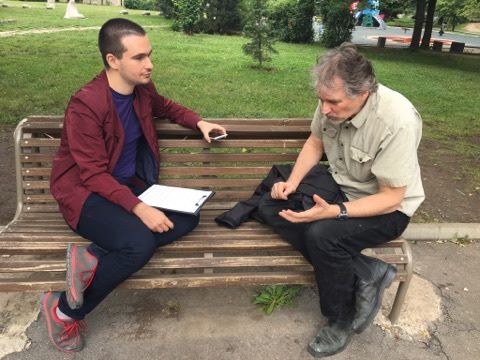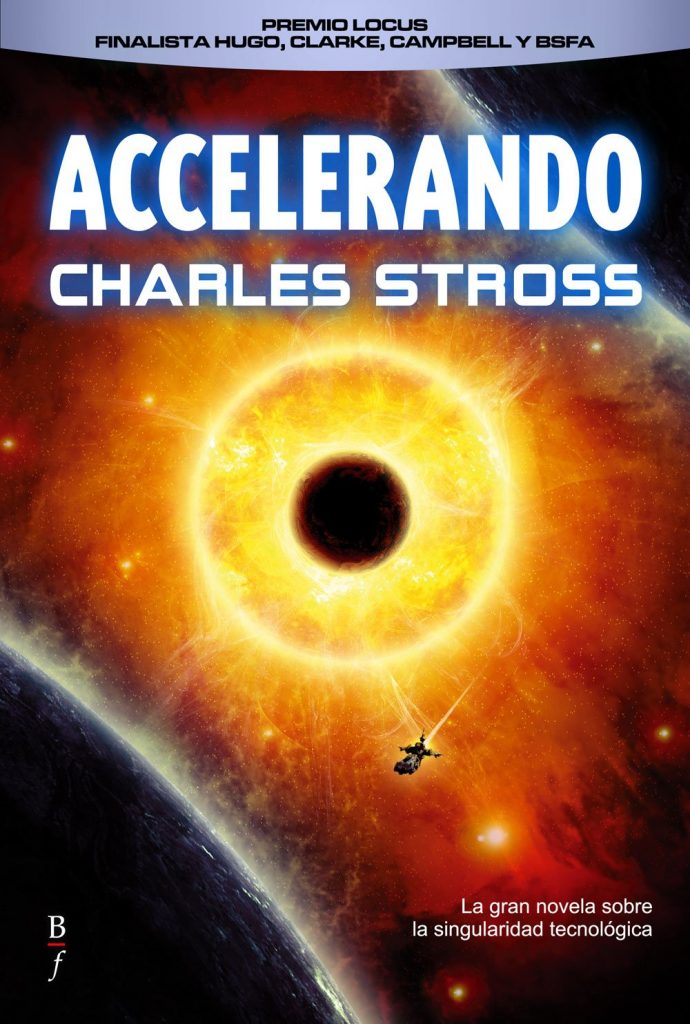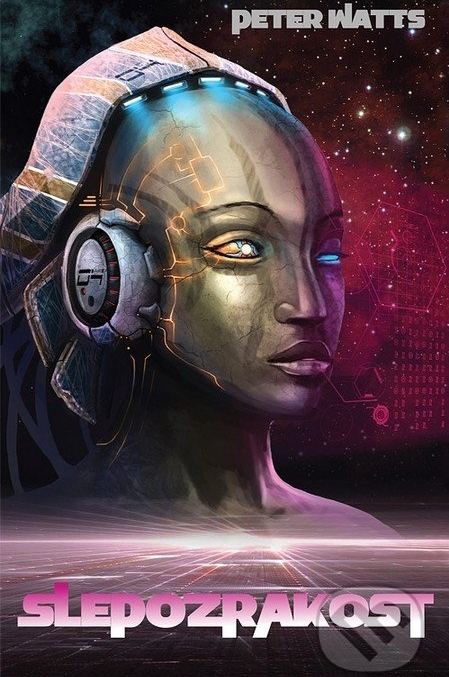
An interview with Peter Watts – Part 1
What is consciousness and how is it related to intelligence? Could consciousness be a parasite? What kind of technological advancements await us and how will they change us?
As you might know, Peter Watts is in Sofia, Bulgaria right now. He will talk on Ratio’s popular science forum about consciousness and the latest developments in neural technologies. I caught up with him on the day before the event and had a long, interesting and intellectual talk about his books, his theories on consciousness, his views on the technology advancements and how far they might go and what he thinks about the world humanity is building for itself.
This is part 1 out of 4 (as I said, it’s a long and interesting interview).
If you want to read the other parts of the interview:
- For Part 2 click here;
- For Part 3 click here;
- For Part 4 click here;
А за версията на български, кликнете тук.

Let’s begin with the science event you’re doing tomorrow. What are you going to talk about there?
Basically it’s going to be a two-part talk. The first part will be about how totally screwed up consciousness is, both as a concept and a physiological state. And then in the back-half I will take what we know about consciousness and apply it to certain trends in neurotechnology that seem to be taking off in a big way. I don’t think a lot of people have thought about the technology, how you can create a brain interface. I don’t think people have put much thought into what that does to the conscious state of an individual being. Possibly because nobody really knows what consciousness is and how to quantify it, so it’s something that you just kinda ignore. But based on observations we’ve made on conjoined twins sharing a brain, on split brain experiments, there’s cause for concern about what happens to you as an individual when you interface with another brain. At least at the kind of bandwidths that groups like Neurolink are contemplating right now.

So do you have a definition about what consciousness is?
Uhm, no. I mean this is the weird thing. Everybody knows what it’s like to be conscious, but nobody knows what consciousness is because Physics doesn’t support consciousness. Physics describes electricity passing through neural circuits. There’s no mechanism by which that could result in subjective awareness. That’s computation. That could be intelligence. All of that stuff is understandable. A subjective state of meat waking up is not something Physics even begins to address. There is no shortage of theories as to how we have consciousness, how we have evolved, what it is. Some people think that consciousness is actually a state of matter, of all matter, like charge or mass. Our brains don’t generate consciousness, they just kinda filter it from the universe. I don’t pretend to understand the math behind it, and there’s a lot of math. I’ve read some of the papers and they glaze my eyes, it seems vigorous enough.
But nobody knows, I think they’re just taking shots at it, they’re coming up with their ideas, but it’s kinda like String theory, it’s almost more philosophy than testable hypothesis. You could create a replication of a human brain, right down to the synapse level in silicone or in software. And you could ask it if it was conscious. And it could say „Yes, I’m conscious“. And because it’s a model of a brain – you can basically look and you can see everything, you can see the circuitry, you can see the input, where you’re asking it if it’s conscious, you can see its output state, saying „Yes, I’m conscious“. And you can trace every neural pathway, every circuit, throughout that incredibly complex system and see how that input leads to that output. „Yes, I am conscious“. But there’s nothing in any of those circuits that requires consciousness. You can follow the logic of the neural net and you can see how that question results in that answer. But consciousness isn’t necessary to generate that answer, so how can you trust that answer?
In your books you tackle that idea of an interface between technology and consciousness – like the virtual world in ‘Blindsight’. Do you think that it is actually possible?
Oh yeah, I completely believe that. If that’s not possible, then none of the brain interfaces the people are working on now are possible. In fact, I think it’s probably simpler than a lot of people are giving the technology credit for. Because a lot of the process, I think, will be handled by the brain, not by technology.
You can give a blind person sight by putting a matrix of needles on their tongue and hooking that matrix up to a camera. You basically have a square pixel array on the tongue. And because the tongue has a really, really high innervation, a really, really high nerve density, it will be very sensitive to when those electrodes discharge. And the weird thing is, if you hook a camera up to that tongue vision, the blind person will begin to see. And it will not be the part of the brain that handles the tongue, that handles the process. The brain will somehow figure that out – even though the input is coming from the tongue, it will shunt it over to the visual cortex. There are experiments and experiments and experiments, in which you basically, to be crude about it, jab a fork into the brain of an animal and connect it to something else and that brain will figure out how to interact through those electrodes. How to create its own interface. So I think in a lot of cases the connection between the brain and the technology is something that the brain will deal with. And we don’t even have to build super high tech neural interfaces. So yeah, I totally believe that those kinds of interfaces are possible.

Do you think that this can be a way to achieve immortality for humanity or a certain individual?
That’s kind of a philosophical question. If you define the individual in terms of the information contained in the body and you can propagate that information into the future, then yeah, why not. I don’t think what you’re doing there though is granting immortality to the individual. I think what you’re doing is making a digitized copy of the individual and that copy persists. But the individual still rots and dies eventually.
But if the consciousness of the individual is transferred to a digitized state…
Why would it be transferred? Why wouldn’t it just be copied?
Okay, yeah, copied. But even if it’s copied, it’s the same consciousness in the digitized state. Or not?
No. Here’s a thought experiment. Someone shows up at your bed one day and they look just like you. And they’re holding a gun to you. And say „I’m going to kill you now. But don’t worry, I have mapped all your neural synapses, they are right in here, and I have all your memories and all your thoughts and all your personality traits. So you will continue to live on in me, because I and you are the same thing“. Would you say at that point „Oh, ok, blow me away?“ Or would you not be entirely copasetic with that? My points is, it’s not a transfer of consciousness. No matter whether a copy of you lives forever, you still have not gained immortality. Something else that thinks it is you, something else that may even have the same claim to being you, might be immortal. But you, the thing that wanted to live forever, are still going to die.
In any event, technology is developing rapidly and you acknowledge that in your works, where the future is very developed in various, different ways. Do you think that humanity will some day get lost in technology?
I think to some extend we already are. They’ve documented actual morphological structural changes in the brain, like big scale structures. We’re not talking about having to go down to take tiny little micrographic pictures, we’re talking about the wrinkles in the cortex and the parietal lobe and so on. Parts of the brain that used to be used for storing information are now being used to store directions for how to find that information online. I think it’s called transactive memory. It’s a form of external cognition – the parts of our brain that used to think are now essentially being used as index cards to find out what we need online. And it’s resulting in a much reduced attention span, in terms of our local cognition, a much shorter memory – we’re losing the ability to remember things. And if you think of yourself as just the individual then that’s a bad thing. If you think of yourself as a composite of you and your cellphone and your cloud data and the internet as a whole, then the system as a whole continues to remember that stuff. But you offloaded much of your cognition. And in that sense, I think we’re getting lost.

Have you read ‘Accelerando’ by Charlie Strauss? There’s a scene in that book, which comes as close as I’ve ever encountered to the sense of what it would be like to be lost. The protagonist basically wears these smart specks. They constantly feed him information about, you know, his stock portfolio and who’s the one he’s speaking to right now and the people he’s interacting with, and he’s got all this information. One day he loses his specks and he can barely remember his name. He’s stumbling around, he’s like a blind man, he’s just like you and me now, but because he’s offloaded so much of that stuff he literally has trouble remembering who he is. That’s being lost.
The papers that are documenting the fact that that’s already started with us, the changes in the brain structures, the transactive memory, those are appearing in top of the line journals like ‘Science & Nature’. We’re not talking, you know, cheesy tabloids, we’re talking really credible studies, showing that that’s already happening to us.
So do you think certain technological developments should be limited or even prohibited?
I suppose it’s a matter of choice. If you want to offload your cognition, then you should be allowed to do that – in the same sense that if you want to kill yourself you should be allowed to do that. Personally, I don’t trust the cloud. I’d like to keep everything as local as I could. I would rather have a memory made out of meat that I can rely on. So in the event of a solar flare taking out the world wide web or in the event of a terrorist EMP that shuts down the lights everywhere, I can still find my way home and recognize my wife without having an electronic augment telling me that.
So if the virtual world from ‘Blindsight’ is invented, will you go inside?
Yeah, I would definitely go. Assuming I can come out again.
But still as a copy, not a transfer?
Now, remember in ‘Blindsight’ the whole thing is, that it wasn’t a copy. Those people still existed in some weird pickle jar form, right? Their brains were linked into an interface, but they were still there. Nobody made a copy of them. There was just the one of them there. And if I could do that with the option of coming out again, yeah, of course, I would want to see what it’s like. To live in a world like this, except that you could jump up in the sky and swim through the air. It would be wild, of course I would want that. And it would be great if I was dying anyway, or if I had some kind of a weird decease and I didn’t enjoy my outside life… Or even if I was just into gaming, suppose like it came out with some new Skyrim 10 or something, I would totally be there, but at some point somebody’s always gonna blow the fuses or the circuits breakers are gonna go out and you’re gonna be on your own… I am loath to invest so much in those alternate realities that I cannot exist outside of them. I think I need the ability to live in meat state. That’s just, again, my personal choice.
What do you think about improving humanity with technology? For example, like the vampire Sarasti in ‘Blindsight’?
How is he an improvement of humanity? He wanted to eat humanity.

But he was more efficient, he was smarter, he was better in a lot of ways.
He was also less conscious. His entire consciousness would essentially be equal to your dream state. So in that sense he enjoyed life less. Having read ‘Blindsight’, you know, I don’t have to worry about giving you a spoiler alert, but one of the ideas that this book plays around with, maybe the essential punchline of the book is that consciousness might be parasitic – it doesn’t actually do anything, it slows things down.
I might be a parasite, but I kinda like being a parasite, right? No tapeworm in the lifelong history of tapeworms ever deliberately flushed itself out of a G.I. tract, just because its host would be better off without it. So from a purely subjective point of view, the things that would augment and increase the efficiency of human beings would involve less and less conscious involvement and decision making. Essentially turning us into zombies. The evidence seems pretty strong at this point that consciousness is an impairment complex problem solving. So if you want to think of human beings as intelligent agencies that solve problems, then you should get rid of consciousness, you should eliminate the parasite.
But I think of humanity as the little self-conscious parasite floating on top of all that. And I enjoy this, i enjoy looking around and thinking. A day does not go by when I don’t kinda stop and realize, how am I even perceiving this, how is this even possible? Sometimes I feel like those 17-year-old nerds who suddenly discovered existential angst. And I should let it go, because every time i think about it, I’m no closer to an answer. But it’s also wonderful to contemplate. It just feels good to exist, to be able to think about these things. It wouldn’t feel bad to be unconscious, it wouldn’t feel like anything, but now that I am conscious… In a weird way, perhaps, increasing the quality of human experience, increasing the nature of consciousness, actually involves making us less efficient. Because if consciousness is an impairment problem solving then the more conscious we become, the more fully we experience life. The dumber we become… Maybe we should be aspiring to dumbness. It seems to work for Donald Trump, anyway 🙂
But if such improvements become possible, you would have to interact in your everyday life with people who are augmented. For example, if you were a character in ‘Blindsight’, would you trust Sarasti as a leader of your team?
Uhm, no, but it’s kind of an unfair question, because having written all those characters, I know that none of them really trusts Sarasti. So I kinda have to side with them. I’m kinda avoiding your question, aren’t I. Forgetting the weird philosophical headship of, in order to be happier you have to be dumber…
It’s not really weird.
Yeah, i know, ‘Ignorance is bliss’ is a cliche, but I’m not talking exactly about ‘Ignorance is bliss’. This is a statement on a lack of knowledge. I’m talking about the trade-off between intelligence, which is different than knowledge, and awareness, the ability to parse all this. But maybe I’m just blowing smoke up my ass, I have absolutely no idea whether or not a greater conscious awareness would compromise one’s ability to solve complex problems or not.

But in a more mundane sense, talking to people with brain implants, they don’t have to sleep, they can access the internet, they can do all this stuff… Yeah, in order to keep up you probably have to jump on that bandwagon and augment yourself in the same way. But again, I would like to be able to unplug if I had to. I would like to be able to plug myself in, when I had to talk to one of you, augmented snobbish persons, and then, when I wanted to just enjoy and smell flowers, I would plug myself out again.
I don’t know, I have nothing against human augmentation. I think we need smarter people and if technology is a way to make people smarter, I’m all in favor of it. But again, when you talk about you, are you talking about your brain or are you talking about the conscious part? Are you talking about intelligence or are you talking about awareness? People always tend to bundle those things together, because that’s our experience. We’ve never seen anything that is self-aware and non-intelligent. Although there is some evidence that maybe we’ve been missing some obvious stuff under our nose. But I can’t think of any fundamental reason why intelligence and consciousness have to be coupled. So I’m gonna side with the part of me that’s conscious.
Speaking about intelligence, the characters in ‘Blindsight’ are pretty intelligent, that’s one of the things I admire about it. They don’t move the plot forward by being stupid, they try to make the best out of their situation. If you were in their situation would you be able to keep up with them?
Oh, of course not. I mean, the whole point of ‘Blindsight’ is that even their dialogue has to be dumbed down for conventional readers. None of them actually talks like that, they are actually talking about 10 different languages at the same time, plus a couple of invented ones, but I have to relate this so you could understand it, so I’m telling you not what they said, but what they meant. Of course, none of us can keep up, that’s the whole point, that’s why they are out there and we are not. I do not believe in these far future science fiction epics where the technology is amazing, but people haven’t changed at all. I think we are going to change ourselves beyond recognition, probably long before we leave the solar system, if we ever do that…
To be continued…
